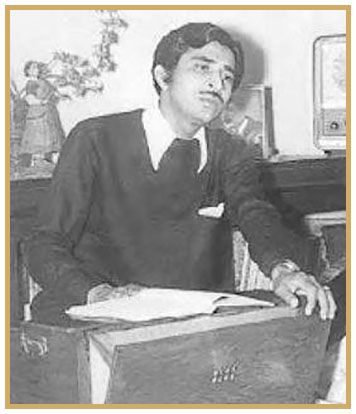Jayanta Hazarika

Subscribe to read full article
This section is for paid subscribers only. Our subscription is only $37/- for one full year.
You get unlimited access to all paid section and features on the website with this subscription.
Not ready for a full subscription?
You can access this article for $2 , and have it saved to your account for one year.
- Born: 20 September, 1943 (Assam, British India)
- Died: 15 October, 1977 (Kolkata)
- Primary Cinema: Assamese
- Parents: Nilakanta Hazarika, Shantipriya Hazarika
- Spouse: Manisha Hazarika
- Children: Mayukha Hazarika
Prominent Assamese singer, music composer and director, and instrumentalist, Jayanta Hazarika was an artist with immense talent, skill and knowledge about the various musical art forms due to which he was able to introduce a lot of revolutionary musical genres in Assam, and thereby in India, through his compositions. Belonging to a highly revered musical family background, his body of work has often been described as a combination of soulful and divine melodies, which marked a significant transition in the Indian music traditions of the time.
The ninth among ten children of Nilakanta and Shantipriya Hazarika, Jayanta Hazarika was the younger brother of eminent singer, composer, and filmmaker Bhupen Hazarika. Growing up in a remarkably gifted musical family, he was intimately surrounded by the knowledge of classical music, instruments, and a passion for this field which he shared with all his siblings. A master of skill, he could proficiently play several instruments, such as the guitar, dumra, mandolin, accordion, tabla, mouth-organ, and the harmonium, an instrument on which his dexterity surpassed many others. From a very early age, he displayed signs of a euphonious aptitude for music and would often accompany his elder brother in stage shows and concerts, as well as in his recording sessions. His unique ability for composing experimental and original tunes was evident from then on, and was even observed by noted lyricist, Hemen Hazarika. His authentic and unconventional style of composition reflected even in his earliest compositions, namely the hit numbers Agali batahe kopale kalare pat and Krishnachura, written by Dr Nirmal Prabha Bordoloi and Mayashri Borkataky respectively, and produced by HMV records in 1962. Both were an instant success and established his career in the industry, both as a singer and composer at the mere age of 20.
In 1963, he made his foray into the world of playback singing in the Assamese feature film Moniram Dewan with the film’s soundtrack being directed by his brother Bhupen Hazarika. He worked with Shyamal Mitra on the song Sonar baran pakhire tor, and for the film Loti Ghoti (1966), he sang a duet with singer Ila Bose. Moreover, he even composed the tune and background score for the feature film Chik Mik Bijulee (1969) and rendered the song Mrityu sabati samadhi tolit, which became a popularly remembered song of its time. Another noteworthy aspect is that for all the above mentioned films, he also worked as an Assistant Director.
His independent projects and film ventures in the role of a Music Director include his work in the feature films Bonoria Phool (1973), Niyoti (1978), Brishti (1974), Dharmakai (1977), and Natun Asha (1977), a film whose work was completed by his wife upon his death. Apart from the more commercially celebrated films, he also composed music for several documentaries such as Flora and Fauna of North East India, Wheels and the Horizon, Sanman and Jyoti Chitraban. Jayant Hazarika was also a consistent performer on All India Radio programmes (Guwahati), wherein he contributed through songs, in-house performances and interviews. These sessions were later compiled and produced as an LP disc by HMV after his death.
In one such interview with AIR, he had mentioned how his first affinity while composing was for the music he created for several stage plays. Some of his notable contributions to theatre through the medium of music were in Siraj by Phani Sarma, Baan by Prafulla Bora and Jinty, Janma, Yudh Ghosanar Din, Jerengar Sati produced by Progoti Silpi Sangha of Guwahati. The artist evidently worked with the Lakhimi Theatre of Goalpara until the very end of his life, and completed 17 songs for five complete drama, and further contributed to their background framework.
Dr Nirmal Prabha Bordoloi most prominently worked with the singer and wrote a significant number of his songs, like Nibir bone je matise ja, Morn am oniruddha, Mayamoi rupali jonak, Akau natun prabhat hobo and many more. His unique and divine compositions have further added a lot of depth and character to the film soundtracks of several movies like Chikmik Bijulee (1969) for which he composed the hit song Mrityu sabati samadhi tolit, Banoria Phul (1973), for which he famously composed the song Tomar marame mor, and Surat magan bhayal rati for the film Bristi Asm (1974).
Still regarded as a torchbearer for introducing Western tunes, experiments and melodies to the traditional music industry of Assam, Jayanta Hazarika inspired many through his passion and vision, and left the world quite early, merely at the age of 34. He passed away on 15th October, 1977 and left a great musical legacy behind, which remains unmatched to this day.







.jpg)



